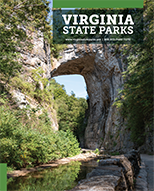Read Our Blogs
An Unsung Pollinator
When most of us think of pollinators, various colorful butterflies come to our minds. Hummingbirds are a favorite as their wings make them seem like large bees. Speaking of which, honey bees are of great concern these days for their decreasing populations. Bumble bees are very distinctive for their size and black and yellow colors. The mason bee is a lesser known insect in comparison. But, a local Girl Scout is helping to put a spotlight on this beneficial bug at York River State Park.
Girl Scout Ambassador Ari Hofman and Chief Ranger Brad Thomas
Ariel (Ari) Hofman, a Girl Scout Ambassador in Troop 1053 of Yorktown, has been busy as a bee by making homes for these dynamic pollinators. Unlike its honey making cousins, mason bees live in small shelters of individual homes. Ari has made and placed bee shelters in front of the Visitor Center and other locations in the park and the James City/Williamsburg area. She also distributes flyers and makes presentations about them. This project is a part of her Girl Scouts of America Gold Award, and equivalent to the BSA Eagle Scout.
Mason bees are far from creating angry swarms intent to kill mammals who get too close for comfort. The males don’t have stingers. The females are non-aggressive and have to be caught in the palm of one’s hands to provoke them to sting. Those who have been stung by a mason compares it to a pinch, or mosquito bite. If you don’t bother them, they will not bother you at all.
Why do mason bees matter?
For starters, they are better pollinators than their honey making cousins. Masons, which resemble house flies, cover themselves in pollen. They have an erratic flight pattern that makes them great cross pollinators. Because they do not live in hives, the Colony Collapse Disorder does not affect them.
A newly installed mason bee shelter
We wish Ari the best in her efforts with the Girl Scouts of America and to make more people aware of this unsung pollinator. Mason bees are gentle creatures that help us enjoy some of our favorite foods. Be on the look-out for their shelters as you enjoy your day at York River State Park.
Directions to York River State Park: From I-64, take the Croaker Exit 231B. Go north on Route 607 (Croaker Rd.) for one mile, then right on Route 606 (Riverview Rd.) about one and a half miles to the park entrance. Take a left turn into the park.
If you have read the article and have a question, please email nancy.heltman@dcr.virginia.gov.
















